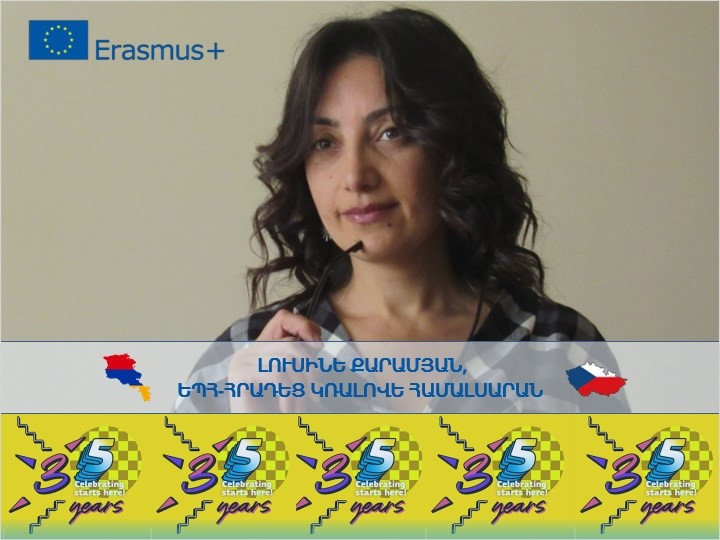Celebrating the 35th anniversary of Erasmus, a success story of Lusine Karamyan, YSU lecturer
Lusine Karamyan, participant of Erasmus+ International Credit Mobility (18.04-01.05.2022)
Home University: Yerevan State University, Faculty of Sociology, Chair of Social Work and Social Technologies
Host University: Faculty of Philosophy, Hradec-Kralove University, Czech Republic
How long have you been teaching at the Faculty of Sociology of Yerevan State University? What keeps you still at the University?
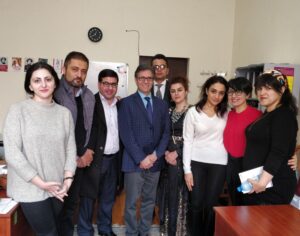 I first entered the university classroom as a lecturer in 2004 and immediately taught the Master’s students, who were almost my peers. A small age difference was already a significant but surmountable challenge for me. To this day, I teach at Yerevan State University, combining lecturing with work at non-governmental organizations. Since 2020, I have been the chairwoman of the Non-Discrimination and Equality Coalition. This Coalition is a union of a number of local NGOs employing social workers, most of whom I have had the opportunity to teach throughout different years of my academic career.
I first entered the university classroom as a lecturer in 2004 and immediately taught the Master’s students, who were almost my peers. A small age difference was already a significant but surmountable challenge for me. To this day, I teach at Yerevan State University, combining lecturing with work at non-governmental organizations. Since 2020, I have been the chairwoman of the Non-Discrimination and Equality Coalition. This Coalition is a union of a number of local NGOs employing social workers, most of whom I have had the opportunity to teach throughout different years of my academic career.
In general, the forms of activity in social work are different, which allows for choosing the path of research. I feel comfortable in academic auditoria․ There used to be other full-time job offers, but I realized that I was not ready to leave the University. I can be useful at YSU seeing how active many of my students are in the professional field and what a significant role they play in the development of Armenian civil society. It is a certain signal for me that I am still needed here as a lecturer.
Thank you, Lusine, I see that being a teacher in demand has worked as a source of strong motivation to go through the eighteen-year academic pathway. And what are your main goals when entering the auditorium?
As Noam Chomsky puts it, “If you are teaching today what you were teaching five years ago, either the field is dead or you are”. When entering the classroom, I take into account the subject-specific novelties, since I consider keeping my students up to date professionally as one of my paramount goals. Ties with industry and organization of internships in social work are also very important aspects․ In addition to the theoretical background, students must also notice what is happening around their field of specialization, hence, I try to ensure this connection and encourage my students to focus more on their professional development and upskilling. And finally, I consider it no less important to refine my student’s professional vocabulary in the university environment, providing them with opportunities to develop a specific academic vocabulary that would differentiate them from other reference groups. A student who’s both interesting and interested in a true source of motivation for me!
How would you describe your students? How do you work and cooperate with them?
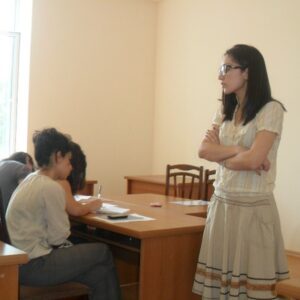 Regretfully, the student literacy attainment bar has significantly decreased during recent years, and it has had a negative impact on student-teacher relationships. For example, nowadays, due to low admission requirements, many students have quite limited vocabulary․ Sometimes I am being interrupted and asked by my students what the words “debate” or “quote” mean. I realize that today I have less direct contact with my students than a few years ago because there is a need to develop a new shared language and understanding between us. I used to think that my recent student audiences were mostly passive and unmotivated due to local cultural and generational differences, but when I traveled to the Czech Republic via Erasmus + mobility program and lectured Czech undergraduate students for two weeks, I came to the conclusion that this may be more of an education problem in modern societies. My Czech colleagues tried to explain this phenomenon by referring to the natural timidness of younger Czech students in BA courses. I cօuldn’t but disagree with them, as the picture was different in MA classrooms.
Regretfully, the student literacy attainment bar has significantly decreased during recent years, and it has had a negative impact on student-teacher relationships. For example, nowadays, due to low admission requirements, many students have quite limited vocabulary․ Sometimes I am being interrupted and asked by my students what the words “debate” or “quote” mean. I realize that today I have less direct contact with my students than a few years ago because there is a need to develop a new shared language and understanding between us. I used to think that my recent student audiences were mostly passive and unmotivated due to local cultural and generational differences, but when I traveled to the Czech Republic via Erasmus + mobility program and lectured Czech undergraduate students for two weeks, I came to the conclusion that this may be more of an education problem in modern societies. My Czech colleagues tried to explain this phenomenon by referring to the natural timidness of younger Czech students in BA courses. I cօuldn’t but disagree with them, as the picture was different in MA classrooms.
You mentioned that you participated in the Erasmus + International Credit Mobility. I know that it allowed you to teach at a Czech university for two weeks․ Did this experience help you in your professional development?
First of all, international mobility helps to witness how professional practice is organized in another country, as well as to analyze and compare what is more developed there with what you believe to excel in. It offers a great opportunity in 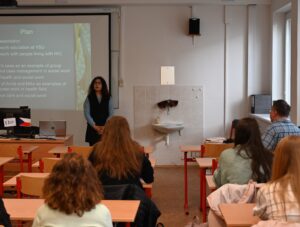 terms of practicing various teaching methods while finding yourself in a multicultural classroom, where the means of communication between the teacher and the students are constructed in different ways, opening new platforms for dialogue.
terms of practicing various teaching methods while finding yourself in a multicultural classroom, where the means of communication between the teacher and the students are constructed in different ways, opening new platforms for dialogue.
For example, for the first time in my life, I taught barefoot [I wore high heels and a formal suit] at Hradec Kralove University. I was informed that there was an agreement between the lecturer and his student group to enjoy classes in a more informal, open communication environment. I took off my heels and sat down on the floor, unlike what I am used to doing in Armenia. And I realized how difficult it has been for me to lecture at YSU entirely on my feet, and how comfortable it is to teach in a less formal classroom. By reducing physical discomfort I was able to completely dedicate myself to the lesson. After all, the lecturer is still a human being, just with merely more academic/professional experience.
During Erasmus+ mobility I tried to apply a different lens of inquiry and understand what motivates their students to come to the university and study there, or in which cases they do not wish to attend the university. All this helps the lecturer to draw the necessary conclusions for their academic and teaching practice. Well, of course, short-term mobility could not suffice to develop key professional skills (they take a longer time to build up), but it did provide me with a great opportunity to work with multicultural audiences and make comparisons.
Did you have any language barriers at the host university? Was it easy to teach in English in a foreign country, in a multicultural classroom?
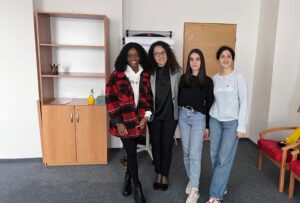 I came across the fact that, contrary to my expectations, not everyone at the university spoke English. In particular, when visiting the rector’s office, I noticed that the staff there does not speak a foreign language. It was different when contacting the international cooperation office․ All employees in this office were fluent in English, as well as willing and supportive. The undergraduate students I taught were mostly locals. They were quite shy and constrained to communicate in English. Nevertheless, it didn’t hold me back. I tried to initiate classroom group work and started classes with icebreakers. This strategy gradually helped to “open up” and include them in the teaching and learning process. On the contrary, my Master’s students, especially those with experience in intercultural communication, were more laid back and unencumbered. As for teaching in a foreign language, it was a very good opportunity for me to recall and refresh my oral English. At first, there was a feeling that something was wrong with my material delivery, but gradually I grew more confident. Through questions and feedback from the audience, I was able to spot whether my words were understood or not. For two weeks I was very encouraged not to speak any other language than English.
I came across the fact that, contrary to my expectations, not everyone at the university spoke English. In particular, when visiting the rector’s office, I noticed that the staff there does not speak a foreign language. It was different when contacting the international cooperation office․ All employees in this office were fluent in English, as well as willing and supportive. The undergraduate students I taught were mostly locals. They were quite shy and constrained to communicate in English. Nevertheless, it didn’t hold me back. I tried to initiate classroom group work and started classes with icebreakers. This strategy gradually helped to “open up” and include them in the teaching and learning process. On the contrary, my Master’s students, especially those with experience in intercultural communication, were more laid back and unencumbered. As for teaching in a foreign language, it was a very good opportunity for me to recall and refresh my oral English. At first, there was a feeling that something was wrong with my material delivery, but gradually I grew more confident. Through questions and feedback from the audience, I was able to spot whether my words were understood or not. For two weeks I was very encouraged not to speak any other language than English.
It is wonderful when challenges only inspire and motivate a person. In your opinion, how is studying at a Czech university different from studying in Armenia?
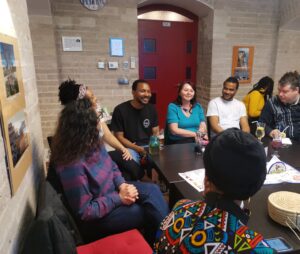 The biggest differences are in the availability of open communication platforms, a highly inclusive environment, the use of informal spaces for teaching and learning as well as lesson planning and delivery through debate clubs. To illustrate, one of the Czech lecturers had his own community cafe, where different communities can hold discussions and debates on various topics. During my mobility, I had a wonderful opportunity to engage in a similar debate on the relationships between Africa and the West. When an African student residing in Europe criticizes Europe for having a dominant influence on African life, you realize how open and free is the environment in which these students study. I also had the opportunity to get in touch with diversity and inclusion, as I witnessed HK students with mental problems serving in an inclusive canteen run as a social entrepreneurship project.
The biggest differences are in the availability of open communication platforms, a highly inclusive environment, the use of informal spaces for teaching and learning as well as lesson planning and delivery through debate clubs. To illustrate, one of the Czech lecturers had his own community cafe, where different communities can hold discussions and debates on various topics. During my mobility, I had a wonderful opportunity to engage in a similar debate on the relationships between Africa and the West. When an African student residing in Europe criticizes Europe for having a dominant influence on African life, you realize how open and free is the environment in which these students study. I also had the opportunity to get in touch with diversity and inclusion, as I witnessed HK students with mental problems serving in an inclusive canteen run as a social entrepreneurship project.
Thank you for an honest conversation, Lusine. My last question: What did Erasmus + International Credit Mobility give you? Are there any specific methods or tools that you are ready to localize in your home university classroom?
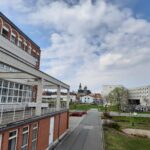 Wherever I visited during these weeks, I always took something for myself and profited from a professional point of view as well. But I am well aware that I can not copy these experiences, they need to be adjusted at YSU. However, I have some ideas. First, to be more effective in the classroom, I must pay attention to my physical comfort. Second, ice cubes can be used not only in the training environment but also in the formal classroom environment, as they help students get to know each other better. And finally, I’m thinking of conducting some courses with small master groups in an informal physical environment. They can certainly contribute to the formation of a teacher-student relationship, as well as closer communication and cooperation between students.
Wherever I visited during these weeks, I always took something for myself and profited from a professional point of view as well. But I am well aware that I can not copy these experiences, they need to be adjusted at YSU. However, I have some ideas. First, to be more effective in the classroom, I must pay attention to my physical comfort. Second, ice cubes can be used not only in the training environment but also in the formal classroom environment, as they help students get to know each other better. And finally, I’m thinking of conducting some courses with small master groups in an informal physical environment. They can certainly contribute to the formation of a teacher-student relationship, as well as closer communication and cooperation between students.

